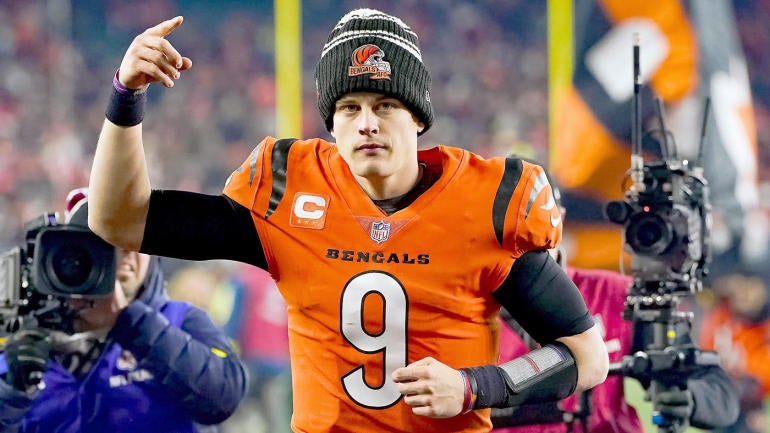High-end contracts are made to be surpassed. That's the nature of the beast in the NFL. The ink should barely be dry on the five-year, $262.5 million contract extension, averaging $52.5 million per year, Chargers quarterback Justin Herbert just signed when Bengals quarterback Joe Burrow replaces him at the top of the NFL pay scale. There's $2.5 million of base salary escalators each in 2028 and 2029 so the extension's maximum value is $267.5 million.
Herbert's deal has $193,738,375 in guarantees, of which $133,738,375 is fully guaranteed at signing. The total amount that can become guaranteed is $218,738,375. That's because $25 million of Herbert's unsecured $47 million 2028 base salary is guaranteed for injury on the third day of the 2026 league year (mid-March 2026). The $25 million becomes fully guaranteed on the third day of the 2027 league year (mid-March 2027).
Burrow isn't in a rush to do a new deal. "It gets done when it gets done," Burrow said on Wednesday. He probably shouldn't set foot on a football field again, after suffering a calf injury that isn't believed to be serious in practice on Thursday, until he has a new contract.
Burrow reiterated he is focused on doing a deal that's good for everybody, which has been prompting speculation he could follow in Patrick Mahomes' footsteps ever since he first expressed the thought a couple of months ago. Mahomes signed a 10-year, $450 million extension worth up to $475 million with incentives in 2020 when he had two years remaining on his rookie deal. The contract is extremely backloaded with the cash flow in the early years lagging well behind other high-end quarterback deals.
Mahomes' $45 million per year dramatically raised the bar for quarterback salaries. It was a 28.6% increase over Russell Wilson's $35 million-per-year deal with the Seahawks, which made him the NFL's highest-paid player in 2019. Mahomes' deal has quickly become outdated. The Chiefs have acknowledged that an adjustment to Mahomes' contract is going to be necessary because of the growth in quarterback salaries.
A true Mahomes-type contract would require a similar increase over Herbert's $52.5 million per year. That would mean $675 million on a 10-year extension, averaging $67.5 million per year. The presumption is Burrow will sign a conventional contract.
Contract length
Burrow should want to give up no more than four new years in a conventional contract. This would allow him to be best positioned for the expected significant salary cap growth in the coming years thanks to the latest media rights deals reportedly worth $113 billion over 11 years and an influx of gambling revenue.
Four new years was the most common length for high-end quarterback contracts, especially with first-round pick extensions, before the Chiefs signed Mahomes. Jared Goff and Carson Wentz received four-year extensions, respectively, from the Rams and Eagles in 2019 when there were two years remaining on their rookie contracts. The first big quarterback deal after Mahomes was Deshaun Watson's four-year extension with the Texans when he also had two years to go on his rookie contract.
Length of contract was a sticking point for Cowboys quarterback Dak Prescott. He played on a franchise tag in 2020 because the Cowboys were insistent on five years when he was adamant about a four-year contract. He eventually got the four-year deal he wanted in March 2021.
Burrow likely won't be able to sign an extension for less than five years because of a trend that started developing with top quarterback contracts in 2022. Cardinals quarterback Kyler Murray gave up five new contract years when he signed a new deal with two years left on his rookie contract. His five-year, $230.5 million extension (worth up to $238 million through salary escalators) averages $46.1 million per year.
Wilson followed suit with the five-year, $245 million extension, averaging $49 million per year, he received from the Broncos last preseason. He also had two years left on his contract.
Giving up five new years has been solidified this year. Herbert's new deal is probably the final nail in the coffin for Burrow being able to get a four-year extension.
Eagles quarterback Jalen Hurts signed a five-year, $255 million extension, averaging $51 million per year, worth up to $270 million because of salary escalators during the latter part of April. There's $180 million of guarantees where $110 million was fully guaranteed at signing.
Ravens quarterback Lamar Jackson received a five-year, $260 million deal, averaging $52 million per year, shortly thereafter. The deal contains $185 million of overall guarantees, of which $135 million is fully guaranteed. The $135 million fully guaranteed at signing includes an NFL-record $72.5 million signing bonus.
The longest big quarterback deal outside of Mahomes' in recent years has been Josh Allen's. The Bills signal-caller signed a six-year, $258 million extension, averaging $43 million per year, in 2021 when he had two years left on his rookie contract. Incentives make the deal worth as much as $288 million.
Average yearly salary
There has only been incremental movement this year when becoming the highest-paid player. The chart below tracks the increases since the Falcons made quarterback Matt Ryan the NFL's first $30 million-per-year player. The jump with Mahomes' deal has been excluded because it's like comparing apples and oranges.
|
Year
|
Highest-paid QB
|
Average salary
|
Previous
|
Average salary
|
Pct. increase
|
|
2023
|
Justin Herbert
|
$52,500,000
|
Lamar Jackson
|
$52,000,000
|
0.96%
|
|
2023
|
Lamar Jackson
|
$52,000,000
|
Jalen Hurts
|
$51,000,000
|
1.96%
|
|
2023
|
Jalen Hurts
|
$51,000,000
|
Aaron Rodgers
|
$50,271,667
|
1.45%
|
|
2022
|
Aaron Rodgers
|
$50,271,667
|
Patrick Mahomes
|
$45,000,000
|
11.71%
|
|
2019
|
Russell Wilson
|
$35,000,000
|
Aaron Rodgers
|
$33,500,000
|
4.48%
|
|
2018
|
Aaron Rodgers
|
$33,500,000
|
Matt Ryan
|
$30,000,000
|
11.67%
|
|
2018
|
Matt Ryan
|
$30,000,000
|
Kirk Cousins
|
$28,000,000
|
7.14%
|
|
Totals
|
$304,271,667
|
|
$289,771,667
|
|
|
Average increase |
|
|
|
5% |
If the current pattern holds, Burrow isn't getting more than $53.5 million per year. A 1.9% increase for $53.5 million per year would be in line with Hurts, Jackson and Herbert's raises.
The average increase of the seven times listed where the quarterback salary bar has been raised is 5%. This would put Burrow at $55.125 million per year. The bigger increase Aaron Rodgers has consistently gotten seems like a remote possibility. At 10%, Burrow would have a $57.75 million-per-year extension.
Cash flow
Herbert's contract has a player-friendly structure, particularly in the initial new contract years. He sets marks for new money after each new contract year. Herbert shatters Jackson's previous standard of $80 million with $100 million (38.1%) of new money through the first new contract year (2025). After the second, third and fourth new years, Herbert has $124 million (47.24%), $160 million (60.98%) and $212 million (80.76%).
The following chart compares the percentage of new money after each year for the five quarterbacks (Herbert, Hurts, Jackson, Murray and Wilson) who have signed traditional deals giving up five new years over the last year.
|
|
|
|
|
|
|
|
|
Player
|
2 years left
|
1 year left
|
1st new year
|
2nd new year
|
3rd new year
|
4th new year
|
5th new year
|
|
Justin Herbert
|
4.88%
|
15.24%
|
38.1%
|
47.24%
|
60.98%
|
80.96%
|
100%
|
|
Lamar Jackson
|
N/A
|
N/A
|
30.76%
|
43.27%
|
60%
|
80%
|
100%
|
|
Jalen Hurts
|
N/A
|
7.84%
|
23.53%
|
40%
|
60%
|
80%
|
100%
|
|
Russell Wilson
|
13.47%
|
13.88%
|
29.78%
|
44.9%
|
61.22%
|
79.59%
|
100%
|
|
Kyler Murray
|
10.63%
|
14.67%
|
31.52%
|
45.67%
|
64.12%
|
79.89%
|
100%
|
Herbert's contract provides a blueprint to address Burrow's concern about having a deal that's good for everybody. His 2023 salary cap number remains $8,456,876 because his $3,224,375 fifth day of training camp roster bonus was converted into signing bonus and prorated for the maximum five years allowed under NFL Collective Bargaining Agreement rules while his $1.01 million 2023 base salary stayed intact.
The Bengals won't have this luxury with Burrow after 4 p.m. ET on July 28. It will be too late to prorate Burrow's $4,535,018 third day of training camp roster bonus. The Bills didn't sign Allen to an extension until about a week after his training camp roster bonus was due. Giving Burrow a $20 million signing bonus would only raise his 2023 salary cap charge by $4 million, taking it from $11,515,043 to $15,515,043.
Herbert's deal contains two option bonuses. The benefit of this structure is the cap numbers are extremely manageable early on because option bonuses are prorated over the life of a contract (up to a maximum of five years), including the option years, beginning in the league year when the option is exercised.
The Chargers are getting $10,158,325 of cap relief in 2024 from the $29.504 million Herbert was scheduled to make on a fully guaranteed fifth-year option before the extension. His new 2024 cap number is $19,345,675. More than half of Herbert's 2024 cap figure comes from the $10,121,300 of proration associated with the $50,606,500 option bonus payment required to pick up his 2028 contract year worth $52 million.
Herbert is making $40 million more over his remaining two contract years (2023 and 2024) than he would have by playing out his contract. By comparison, Mahomes only got a miniscule $6 million more over his remaining two years (2020 and 2021).
Herbert's cap number nearly doubles to $37,345,675 in 2025. The second option payment of $45 million, which is prorated at $9 million annually from 2025 through 2029, occurs in 2025. Herbert's 2026 cap number increases by $9 million to $46,345,675.
There's a $12 million jump in 2027 to $58,345,675 before Herbert's cap number peaks in 2028 at $71,121,300. It drops to $59.5 million in 2029, the final year of the deal.
Salary guarantees
The amount of Herbert's guarantees should make it a necessity for the Bengals to establish a new contract precedent by giving Burrow traditional salary guarantees in order to get a deal done. Cincinnati is in the dark ages when it comes to structuring contracts for veteran players. The only guaranteed money in Cincinnati veteran contracts is a signing bonus and/or a roster bonus payable within a few days of signing. The bigger deals contain an unsecured third or fifth day of the league year roster bonus in the second and third years. The roster bonuses are supposed to be substitutes for additional contract guarantees. The overall guarantees in Bengals contracts are less than comparable deals on other teams.
The Packers structure contracts the same way as the Bengals. The exception has been Rodgers. The veteran contracts he signed while playing for the Packers had traditional salary guarantees.
The Steelers refused to give traditional salary guarantees in veteran contracts until two years ago. A new contract precedent was set with edge rusher T.J. Watt in 2021 when he signed a four-year, $112.011 million extension, averaging $28,002,750 per year, that made him the league's highest-paid non-quarterback. Watt's $80 million fully guaranteed at signing is a record for non-quarterbacks.
The only other Steelers player to get treated like Watt is three-time All-Pro safety Minkah Fitzpatrick. He signed a four-year extension, averaging $18.247 million per year and containing $36 million fully guaranteed, last June.
The Bengals seemingly have been preparing to give Burrow a contract with a conventional structure. The naming rights to Paul Brown Stadium were sold to Paycor, a Cincinnati-based company specializing in human resources software last August. Additional team sponsors have also been added.
These moves will make it easier for the Bengals to comply with the NFL's archaic funding requirements that should come into play for a Burrow contract. Teams are essentially required to put into an escrow account the amount of any guarantees in a contract other than those just for injury, including ones in future contract years.
Burrow should have the second-most guarantees in an NFL contract provided the Bengals are willing to change their standard practices for him. That would put Burrow only behind the $230 million Watson got when the Browns gave the quarterback a fully guaranteed five-year contract in connection with his trade from the Texans last offseason. Burrow's deal having $200 million of injury guarantees at signing, where $140 million of the $200 million is fully guaranteed upon the contract's execution, could be in order after Herbert's deal.
Cincinnati refusing to deviate from a longstanding structural convention might require a signing bonus of at least $100 million and outrageous cash flow to consummate a deal. The signing bonus would be Burrow's only true guaranteed money.
Hurts, Herbert and Jackson have $110 million, $133,738,375 and $135 million fully guaranteed at signing, respectively. The exaggerated cash flow and frontloading of the contract would be to make up for the trio having between $180 million and $193,738,375 of overall guarantees. The Bengals might have to go as high as 42.5%, 50%, 66.7% and 82.5% after the first, second, third and fourth new contract years to preserve a contractual precedent about salary guarantees.
Agent's Take: How Justin Herbert's record-setting contract will affect Joe Burrow's pending extension - CBS Sports






/cloudfront-us-east-1.images.arcpublishing.com/gray/XIQERCRLANAMVG222T7GZQGHEU.jpg)


/cloudfront-us-east-2.images.arcpublishing.com/reuters/MDPS6JIXNRPP3FNI4SG6BC7YAQ.jpg)
/cloudfront-us-east-1.images.arcpublishing.com/gray/LKLBE7TKU5DNDL3HEGL3PKBY7I.bmp)

